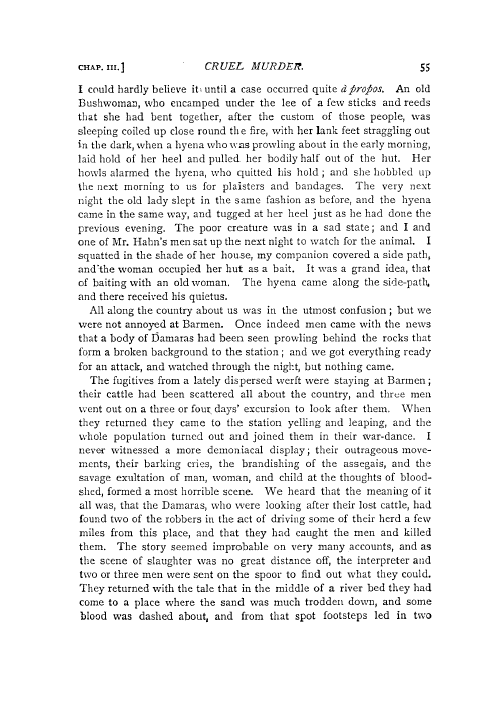CHAP. 111.1 CRUEL MURDER.
55
I could hardly believe it i until a case occurred quite d jbrobos. An old Bushwoman, who encamped under the lee of a few sticks and reeds that she had bent together, after the custom of those people, was sleeping coiled up close round the fire, with her lank feet straggling out in the dark, when a hyena who was prowling about in the early morning, laid hold of her heel and pulled her bodily half out of the hut. Her howls alarmed the hyena, who quitted his hold ; and she hobbled up the next morning to us for plaisters and bandages. The very next night the old lady slept in the same fashion as before, and the hyena came in the same way, and tugged at her heel just as lie had done the previous evening. The poor creature was in a sad state; and I and one of Mr. Hahn's men sat up the next night to watch for the animal. I squatted in the shade of her house, my companion covered a side path, and'the woman occupied her hut as a bait. It was a grand idea, that of baiting with an old woman. The hyena came along the side-path, and there received his quietus.
All along the country about us was in the utmost confusion ; but we were not annoyed at Barmen. Once indeed men came with the news that a body of Damaras had been seen prowling behind the rocks that form a broken background to the station; and we got everything ready for an attack, and watched through the night, but nothing came.
The fugitives from a lately dispersed werft were staying at Barmen ; their cattle had been scattered all about the country, and three men went out on a three or four days' excursion to look after them. When they returned they came to the station yelling and leaping, and the whole population turned out and joined them in their war-dance. I never witnessed a more demoniacal display; their outrageous movements, their barking cries, the brandishing of the assegais, and the savage exultation of man, woman, and child at the thoughts of bloodshed, formed a most horrible scene. We heard that the meaning of it all was, that the Damaras, who were looking after their lost cattle, had found two of the robbers in the act of driving some of their herd a few miles from this place, and that they had caught the men and killed them. The story seemed improbable on very many accounts, and as the scene of slaughter was no great distance off, the interpreter and two or three men were sent on the spoor to find out what they could. They returned with the tale that in the middle of a river bed they had come to a place where the sand was much trodden down, and some blood was dashed about, and from that spot footsteps led in two

